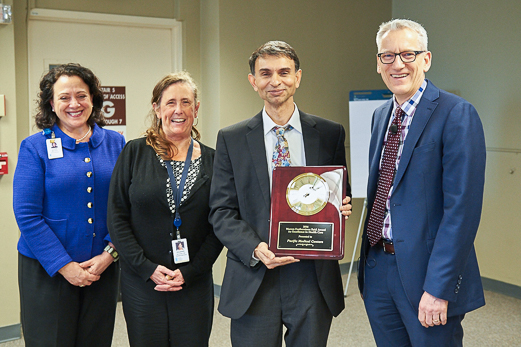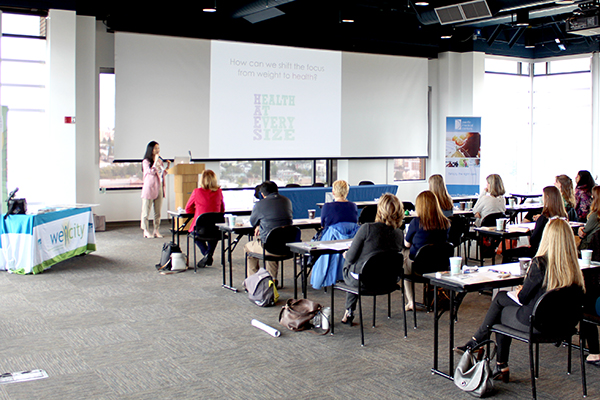PacMed Wins Warren Featherstone Reid Award for Excellence in Healthcare
Pacific Medical Centers is proud to announce that it has been given the 2016 Warren Featherstone Reid Award for Excellence in Healthcare. This distinguished award recognizes and honors healthcare providers in Washington who go above and beyond in providing the highest-quality care for its patients. This honor exemplifies the commitment Pacific Medical Centers makes to its community in providing expansive healthcare access, quality clinic care and innovative, creative health services.
The Warren Featherstone Reid Award recognizes Pacific Medical Centers’ efforts to champion change in removing hurdles for underinsured patients. Pacific Medical Centers was a founding member of Project Access Northwest, which established core programs specifically committed to helping patients navigate their diverse healthcare needs ranging from medical to dental, regardless of coverage status.
This esteemed award recognizes the high-quality care benchmarks that Pacific Medical Centers sets for the community. For instance, Pacific Medical Centers was rated by the National Committee for Quality Assurance in the 90th percentile for six diabetic measures, and above the 75th percentile for preventative cancer screening measures. Additionally, Pacific Medical Centers has provided nearly 24,000 medical referrals over the past ten years, and has changed hospital policies to expand care to a greater number of Charity Care-eligible patients.
Pacific Medical Centers is dedicated to expanding access to patient-centric, quality and affordable medical care to ensure everyone has a chance to lead a healthier life. Please join us in congratulating our dedicated teams across 11 clinics and our inspirational leader, CEO Linda Marzano, on receiving the Warren Featherstone Reid Award for Excellence in Healthcare. Our team’s tireless efforts will continue to bring impactful change to Puget Sound healthcare access and quality of care.
New Spring Classes from the Living Well Alliance
Classes from the Living Well Alliance help local organizations provide wellness programming to their employees. Their 45- to 60-minute classes are interactive, fun, current—an easy fit for your worksite.
This spring, we are rolling out a two new Take a Break to Educate classes:
- Participants in our new Quick, Healthy Meals class will gain skills to help them pull together nutritious meals when there is no time to spare. Together, we will discuss how to plan a meal, be efficient in the grocery store and cut corners in the kitchen to save time, dirty dishes and sanity.
- In Brain Boost, participants will learn ways to help protect their brain against memory decline as they age. The class will touch on various nutrition and lifestyle factors.
Our up-to-date, research-based topics can help you promote health and disease prevention among your employees. All classes are taught by qualified health professionals.
Learn more at the Living Well Alliance website. For the latest class information, click the Take a Break to Educate button for class descriptions and the Program and Services button for pricing.
The Living Well Alliance is run by Pacific Medical Centers. Call us today at 1.855.550.8799 for more information or send us an email.
Recipe: Lemon-Garlic Salmon Foil Pack with Green Beans and New Potatoes
Salmon has never been easier to cook, wrapped up in a packet to bake in the oven. As a bonus, crunchy green beans and garlicky potato slices are added for a complete meal.
How Vitamin D May Affect Depression
It’s no secret that vitamin D contributes to the development and maintenance of healthy, strong bones. But did you know that it is also being researched for its effects on depression?
Here Comes the Sun!
Our bodies naturally synthesize vitamin D when exposed to sunlight. All you need for a week’s worth of vitamin D is 15 to 20 minutes in the sun. Vitamin D helps the body absorb calcium, which supports the development and maintenance of healthy bones. This is critical in children as they grow. Adults also need vitamin D and calcium to prevent osteoporosis, or brittle bones, as they age.
While we’ve known about the connection between vitamin D and calcium for some time, more recent research is looking into the connection of vitamin D to depression. It is possible that this vitamin may play a role in improving symptoms of depression and seasonal affective disorder (SAD). Other research has shown that vitamin D may also improve muscle recovery, help prevent soreness and aching, and help with immune function.
You can get small amounts of vitamin D from foods including fish, eggs and fortified milk, but for people living in the Seattle area, it’s hard to get enough vitamin D without taking a supplement, particularly during winter.
Balancing Vitamins and Sunshine
The Institute of Medicine recommends a minimum daily allowance of 600 international units (IU) of vitamin D per day and 800 IU per day for people over age 70. People living in the Pacific Northwest may need more than this due to our limited exposure to the sun, particularly during winter.
Lisa Sieberson, DNP, ARNP, recommends to her patients that they take a daily vitamin D supplement with 1000 to 2000 IU to ensure sufficient vitamin D levels.
During the summer months, when the sun does come out in Seattle, it is easier to get those 15 to 20 minutes of sunshine per week. However, keep in mind that sunscreen blocks the UV light that allows our skin to synthesize vitamin D.
She doesn’t advise going into direct sunlight for extended periods of time without sunscreen, especially for those who are fair skinned or have other risk factors for skin cancer. For this reason, it may be worthwhile to take vitamin D supplements all year round.
Some people are more susceptible to low vitamin D than others. People with darker skin tones need more sunlight to synthesize enough vitamin D. Breast-fed infants are also prone to vitamin D deficiency because breast milk does not usually contain a sufficient amount of vitamin D and infants should not be exposed to direct sunlight.
Seattle’s latitude and propensity for cloudy days make it hard for all of us to get enough vitamin D, so if you’ve got the rainy-day blues and aren’t already taking vitamin D, you might want to consider a supplement to boost your vitamin D. Talk with your doctor!
Learn more about the author, Lisa Sieberson, DNP, ARNP or call 206.505.1300 for an appointment.
Is My Son Depressed, or Just Lazy?
By Jack Shriner, LICSW, CMHS
I have been asked this question by many parents with sons in middle and high school. In fact, this question often brings a family in for an initial appointment with a psychotherapist. Although I mostly hear from mothers worried about their sons, my thoughts apply well to fathers and daughters, too.
A mother will express concern that her son has been withdrawn, holed up in his room, eyes glued to his Xbox. He seems more irritable. Also, his grades may be lower than last year, he doesn’t spend as much time with friends, and it’s like pulling teeth to get him to do his household chores—let alone get ready for school in the morning.
So, does the son have a psychiatric condition that needs treatment? Or is he just pulling a fast one to get out of doing work? For parents, this often leads to another question: do I respond with concern or with discipline?
First, be sure to review the typical signs of clinical depression in the accompanying article.
It is important to remember that—aside from statements about suicide or evidence of self-harm—it’s perfectly normal for anyone to experience one or two of these things from time to time. We start talking about depression only when the symptoms are ongoing and excessive, and they cause clear problems with a child’s functioning at home or school.
So, let’s say your child is showing some signs of depression. You can be a positive influence. For starters, drop the word lazy from your vocabulary. The best way to change a child’s behavior is to encourage the behavior you want, not to criticize the behavior you don’t want. Using negative labels like “lazy” is more likely to discourage your son and may even confirm thoughts that he’s not living up to your expectations.
The bottom line is that good parenting involves a constant dance between concern and discipline. This dance is challenging, and no parent is always going to get it right. If you suspect your pre-teen or teenage son is depressed, consider the following responses:
- Think of discipline as teaching, not punishment. Keep a calm, neutral tone when setting and enforcing rules.
- Help your son make a plan for coping positively with sadness or stress. For example, consider using art, writing, music, exercise, relaxation, or outings.
- Share how you deal with feelings that arise in your life, such as frustration after a hard day at work.
- Limit factors in your son’s environment that seem to trigger negative feelings. For example, if you feel the Xbox is not helping, relocate it to the living room and limit his use.
Other circumstances such as grief, drug use or a condition called hypothyroidism can cause symptoms similar to depression. These should be ruled out by a health professional and treated appropriately.
Seek out a psychotherapist for additional help if needed. Don’t be afraid to ask lots of questions!
Jack Shriner, LICSW, CMHS, is a licensed clinical social worker at Pacific Medical Centers at Beacon Hill. Learn more about Jack and our other Behavioral Medicine providers. To make an appointment call 206.621.4045.
Know the Signs and Symptoms of Depression
 Depression is a common and treatable condition. This brain condition leaves a person feeling sad—but it’s different from normal sadness.
Depression is a common and treatable condition. This brain condition leaves a person feeling sad—but it’s different from normal sadness.
Depression can make it hard to work, concentrate or do everyday tasks. Depression can affect anyone, regardless of age, gender or health situation. It can affect people of any race or ethnic group.
What Are the Symptoms of Depression?
People with depression feel down most of the time for periods lasting at least two weeks. They also have at least one of these symptoms:
- No longer enjoy or care about doing the things they used to like to do
- Feel sad, down, irritable, hopeless or cranky most of the day, almost every day
Depression can also make people:
- Lose or gain weight.
- Sleep too much or too little.
- Feel tired or have no energy.
- Feel guilty or worthless.
- Forget things or feel confused.
- Think about death or suicide.
Are There Treatment Options?
Safe and effective treatments for depression are available. They include seeing a psychotherapist, taking medications or a combination. Talk with your primary care provider to decide what options are right for you.
As you recover, remember that taking good care of yourself can also help boost your emotional state. Specifically, get regular exercise, like walking briskly or cycling three to five times each week. Be sure to eat a healthy and balanced diet. Avoid drugs and alcohol; they can worsen depression symptoms.
Finally, reach out to friends and family whom you are comfortable with. Talking openly and surrounding yourself with supportive, understanding people is important for recovery.
Learn more about our Behavioral Medicine team at PacMed. Our team of licensed therapists offers individual, couples and family therapy. They also can help with medication management and provide psychiatric evaluation. To make an appointment, use our appointment tool or call 206.621.4045.
Are You or Someone You Know in Crisis?
If you are thinking about suicide or hurting yourself, help is available:
- In an emergency, call 9-1-1
- Go to the emergency room at your local hospital
- Call the King County 24-Hour Crisis Line: 1 (866) 427-4747
- Call the National Suicide Prevention Lifeline: 1 (800) 273-8255
- Call your health care provider and tell them it is urgent









